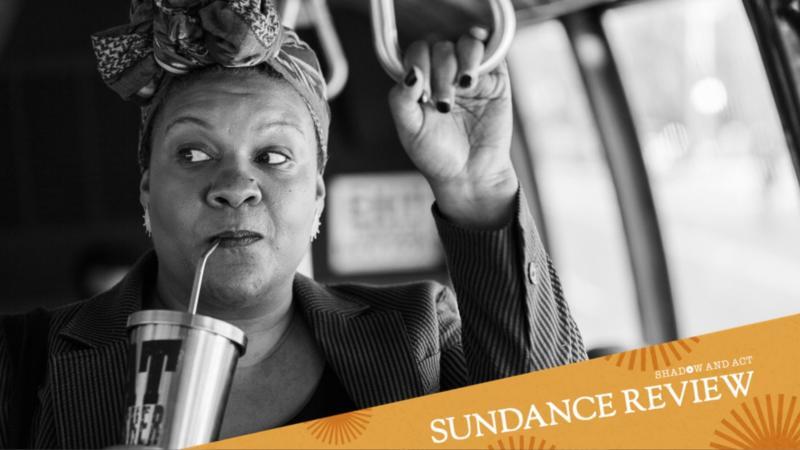Grief has a way of highlighting time and forcing us to face mortality. It directs us to examine our dreams, aspirations and life’s journey. In Radha Blank’s outstanding debut feature, The 40-Year-Old Version, the writer, director, producer and star grapples with defining success, fearlessness and the limits we put on ourselves.
Shot in crisp 35mm black and white, reminiscent of classic 1970s New York films, The 40-Year-Old Version introduces us to Radha, a fictionalized version of the filmmaker. A once-acclaimed playwright who made it onto a prestigious “30 under 30” list, Radha is now struggling to find her voice and her power in the wake of her mother’s death. With her 40th birthday approaching, Radha spends her days teaching a crew of rambunctious high school students dramatic writing and taking long sips of a disgusting diet drink in a futile effort to lose weight.
Though she’s written a promising new play, Harlem Ave, its only hope of being accepted into the very white New York City theater scene will be after extensive rewrites and thrusting a white woman at the center of the plot. These are changes that Radha isn’t sure she can live with. Determined to shatter the struggling artist stereotype, Radha becomes reinvigorated by her long-forgotten passions; hip-hop and rapping. Embolden by the dazzling beats of a twenty-something Brownsville producer, D. Possible (a stoic and brilliant Oswin Benjamin), Radha begins channeling her pain and frustration through the rhymes and flows of her alter-ego, RadhaMUSprime.
Her raps like, “Poverty Porn” and “Black Woman Ass On a White Man,” along with D’s quiet encouragement, make Rhada feel alive. Yet she’s increasingly aware of the absurdity of her new passion. Trying to keep what he believes is a mid-life-crisis at bay, Rhada’s life-long best friend and agent, Archie (Peter Y. Kim), convinces her to rewrite Harlem Ave to regain her former glory as a darling of the New York theater scene. Under the direction of an absurd white producer, Josh (Reed Birney), whose latest claim to fame is a Harriet Tubman musical, Radha casts rapping aside for a white-washed Harlem Ave at a cost she never expected to pay.
From Radha’s hormonal students to the homeless man who has taken up residence outside of her apartment, The 40-Year-Old Version is an intimate look into Radha’s life. Her varied headwraps, unanswered calls from her brother, lyricism and the lingering memory of her mother speaks to Black women who have clambered for everything they’ve ever gotten, only to wake up in a near-empty apartment unsure of their next steps.
As hilarious as many of Radha’s musings are, especially when it comes to the interactions she has with her students (one of them calls her “Queen Latifah and Judge Judy rolled into one”), The 40-Year-Old Version is also very raw. Radha’s fears and frustrations are palatable. The pain of losing a parent, forgotten dreams and not living up to one’s noted potential are all hyper-relatable. It’s a sharp and heartfelt narrative the keeps you invested for the film’s 129-minute run-time.
Vulnerable but vibrant in all of it’s black, white and grey-hued glory, The 40-Year-Old Version is an ode to BLACK Harlem, fearlessness and the art of putting yourself on. Instead of a typical mid-life-crisis narrative, it’s a reminder that age doesn’t define you. Dreams and aspirations don’t simply fade away in time. In fact, the longer you’ve been navigating this planet (especially as a Black woman), the more you owe it to yourself to do what sets your soul on fire.
The 40-Year-Old Version premiered at the Sundance Film Festival on January 25, 2020.
READ MORE:
‘Bad Hair’ Has A Lot To Say But Never Says It [REVIEW]
‘Charm City Kings’: Coming-Of-Age Drama On Black Dirt Bike Riders Gets Release Date
Sundance 2020 Includes ‘Zola,’ ‘Charm City Kings,’ ‘Sylvie’s Love’ And More
MACRO Lodge Back At Sundance With Events Including Kerry Washington, Issa Rae And More
Photo: Eric Branco/Courtesy of Sundance Film Festival
Aramide A. Tinubu is a film critic, consultant and entertainment editor. As a journalist, her work has been published in EBONY, JET, ESSENCE, Bustle, The Daily Mail, IndieWire and Blavity. She wrote her master’s thesis on Black Girlhood and Parental Loss in Contemporary Black American Cinema. She’s a cinephile, bookworm, blogger and NYU + Columbia University alum. You can find her reviews on Rotten Tomatoes or A Word With Aramide or tweet her @wordwitharamide
From Harlem to Hollywood, get the Black entertainment news you need in your inbox daily.

